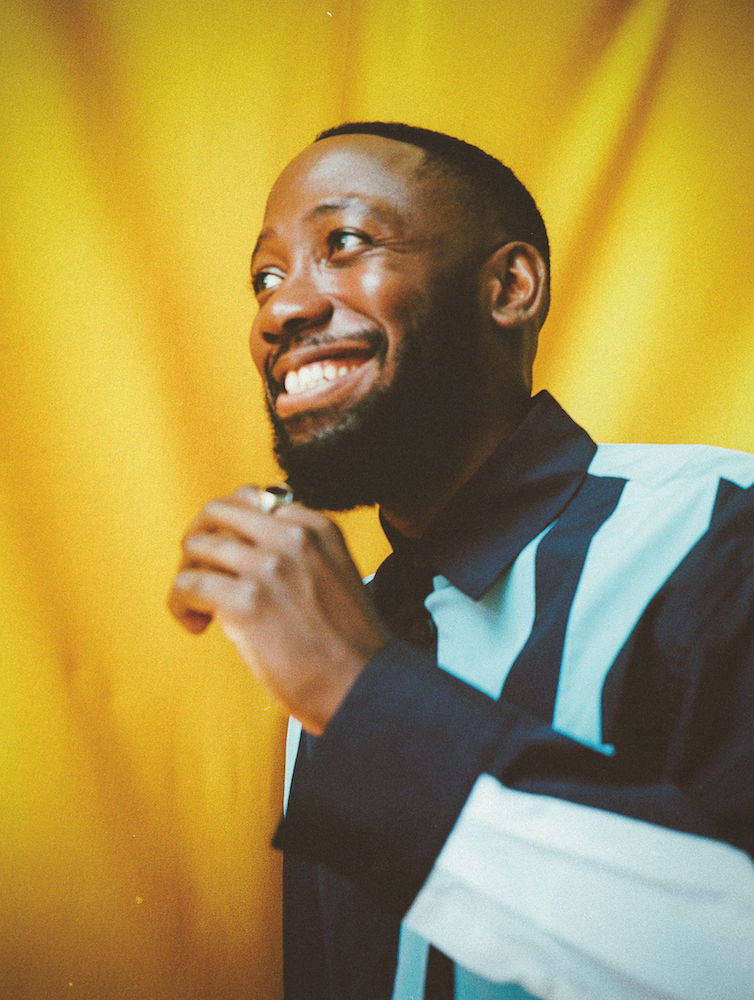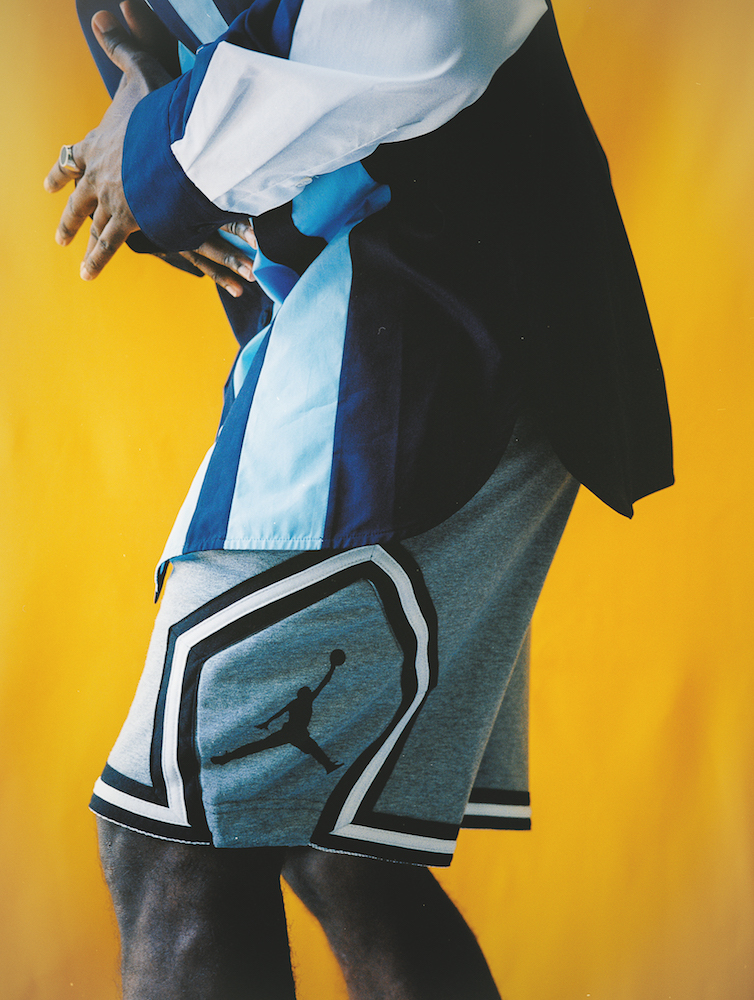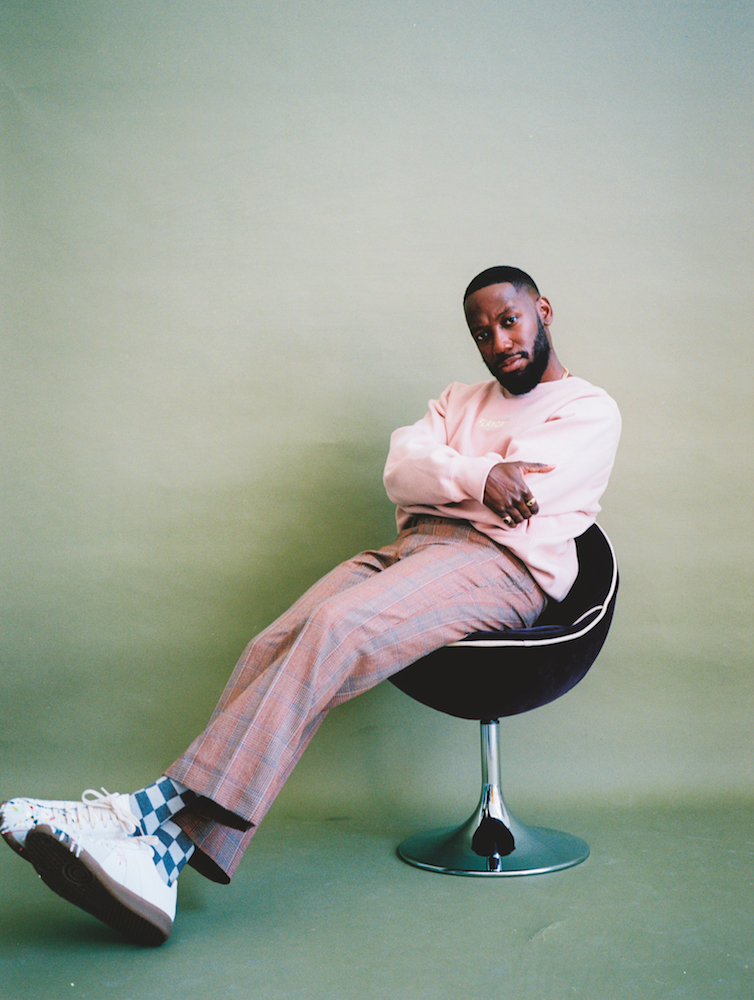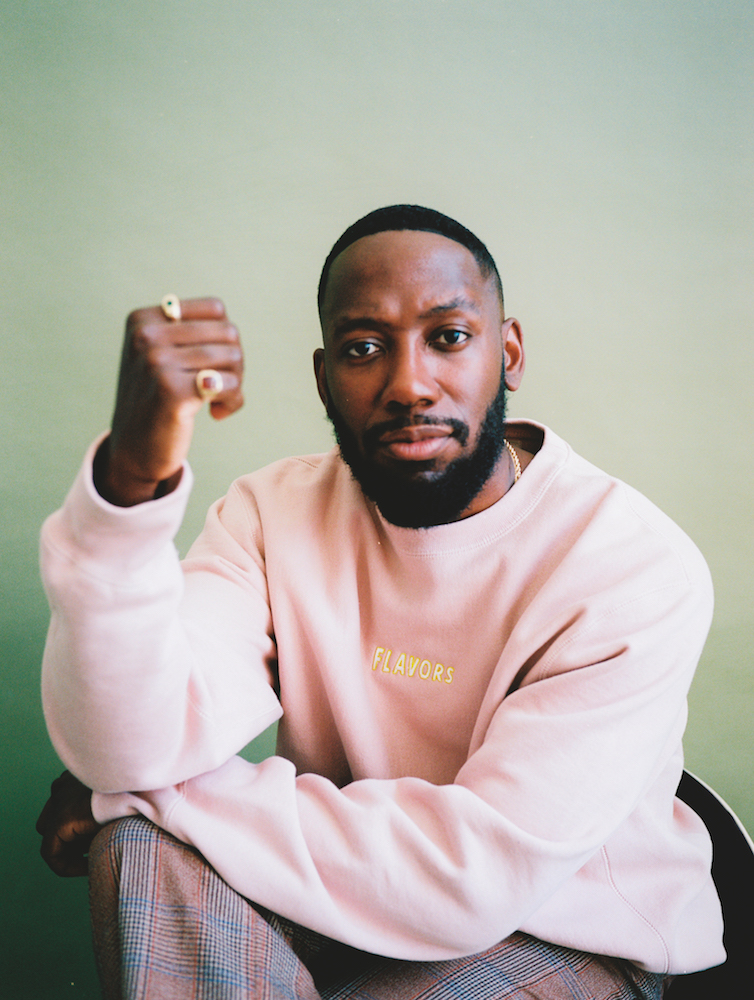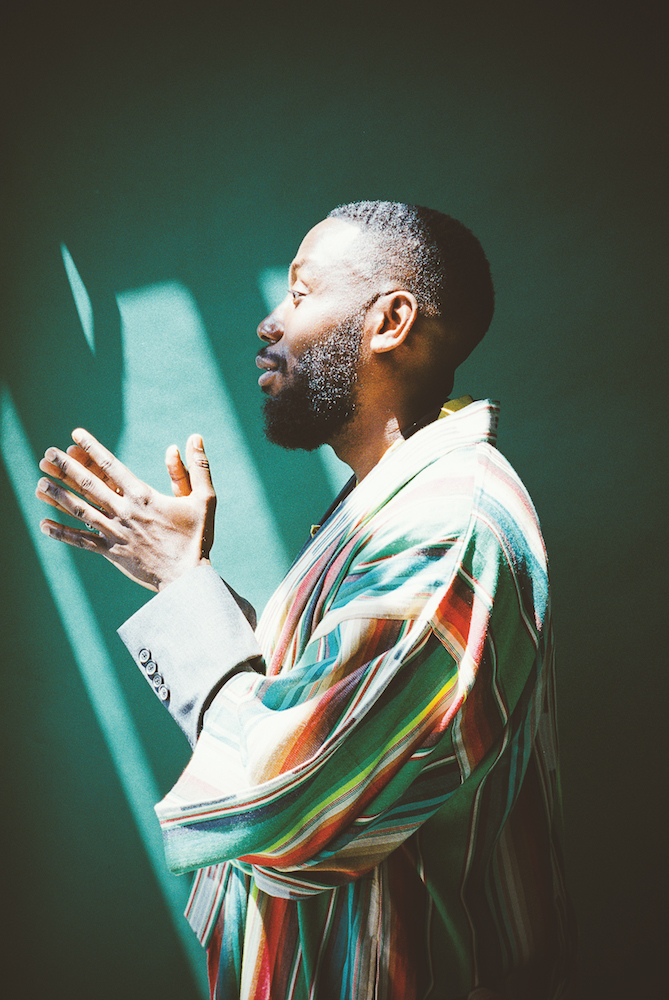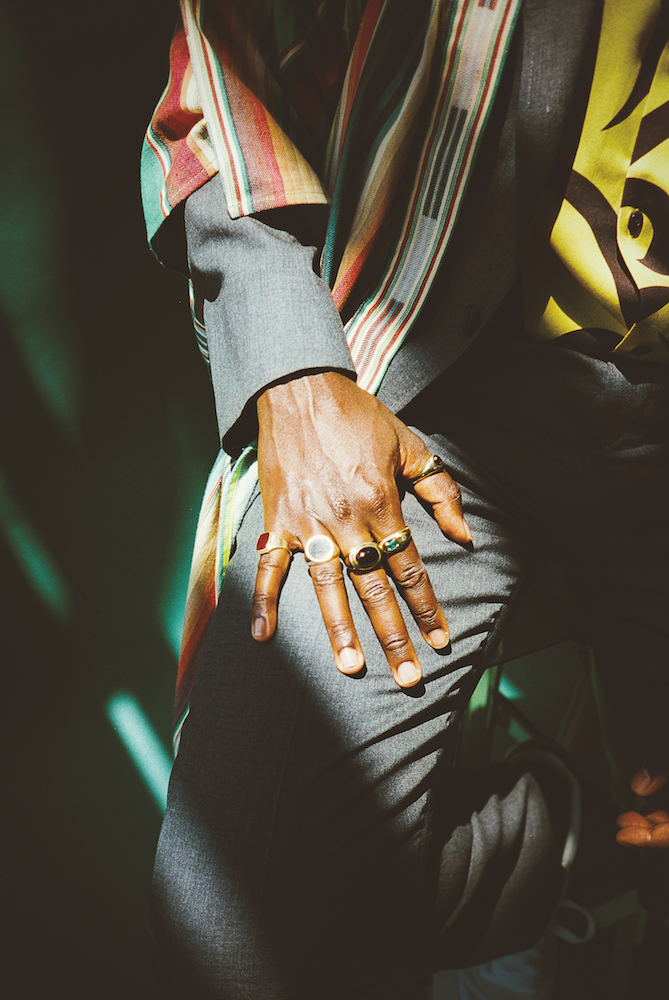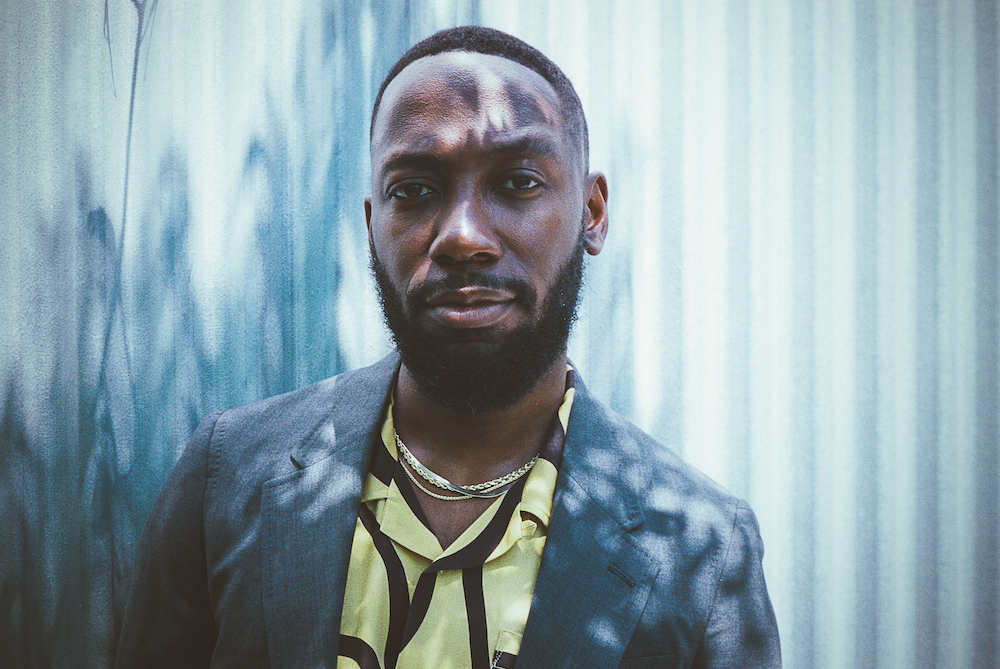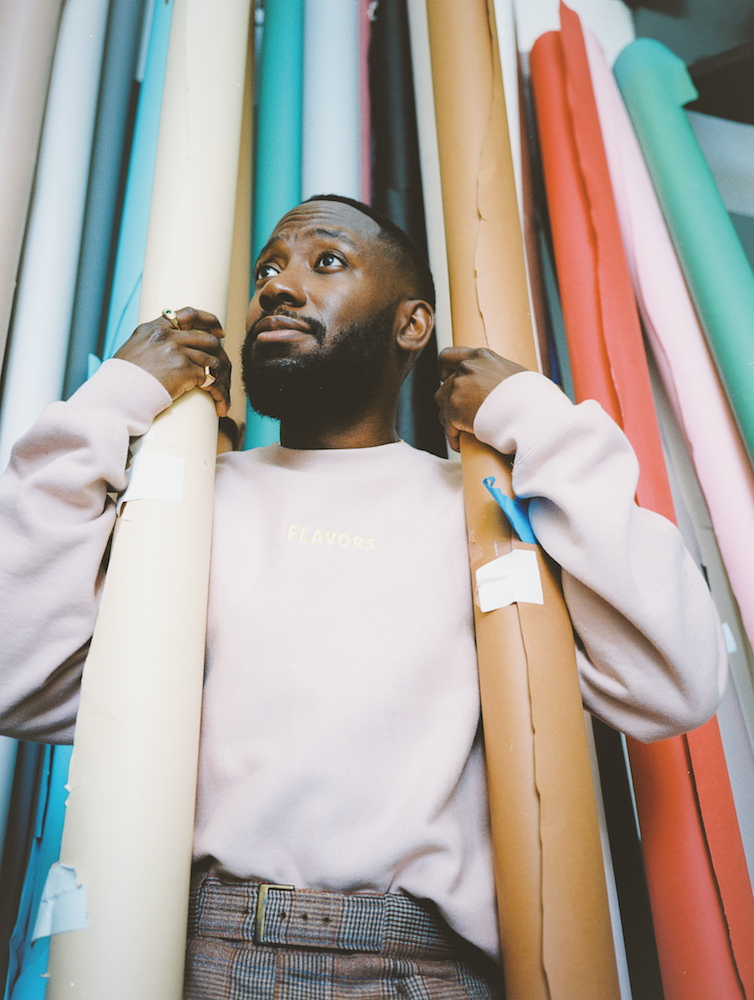In Hulu’s “Woke,” Lamorne Morris plays a cartoonist on the road to racial awakening. It’s the 37-year-old actor’s first lead role—and one that couldn’t be more relevant in 2020.
Lamorne Morris laughs easily and often. As we talk over Zoom, his laughter punctuates our conversation. He giggles at a ridiculous statement he’s about to make right before he says it, he chuckles at my jokes (something about talking to a funny person makes me want to be funny too), and he laughs incredulously at how baffling racism can be.
That’s not to say he doesn’t take racism seriously. It’s just that his approach is to laugh through the pain. When he first logged on to Zoom wearing a white T-shirt, a tan cap, and a light beard, he mentioned a slight headache he’d had all day. But then of course he laughed it off, joking about not trusting the natural Tylenol he’d found at his Airbnb. We’re both in Austin, but we’re chatting online to keep a respectful social distance.
The 37-year-old actor stars in the new show “Woke,” which debuted on Hulu on September 9. After spending seven years embodying the lovable Winston Bishop as part of the ensemble cast of “New Girl,” Morris now has his first lead role as Keef Knight. Keef is a Black cartoonist living in San Francisco who’s about to make it big until an unfortunate encounter with local police causes him to have a racial awakening (complete with talking animated objects, including Cedric the Entertainer as a trash can and Nicole Byer as a bottle of malt liquor). The story is loosely based on the real Keith Knight, who is the cocreator and writer of the show.
Morris is based in L.A., where he’s lived since 2008, but he came to Austin with the idea of buying land in Texas and making it his second home. He’s been to Austin for festivals and wanted to see what it was like outside of industry events, though due to the pandemic, he still hasn’t been able to see the city under normal circumstances in the two weeks he’s been in town. But Morris already knows he likes Texas, since he makes regular trips to visit a friend who owns a ranch outside of Dallas. He likes the open space out here. Plus, he likes guns.
“Texans like guns and I like guns,” Morris says. “I don’t own a gun, but I do like practicing at the gun range and figuring out the specific types.”
He illustrates this affinity for guns with a brief anecdote about an old woman from Texas he knows who always has two guns on her. She’s the one who taught him how to shoot properly. Morris is full of random asides like this. At one point, when we’re talking about music, he mentions Engelbert Humperdinck and, barely suppressing a giggle at the name, he briefly belts out Humperdinck’s version of “Quando Quando Quando,” one of his favorite songs. He’s talking about his eclectic taste in music, particularly because music is how he gets into his characters.
As Travelers, We Must Do Better to Combat Racism →
“Whenever I’m prepping for a character, that’s the first thing I do,” Morris says. “Ask myself, ‘What kind of music do they listen to?’ And if the script doesn’t provide it, I’ll make it up depending on how I feel like performing that character.”
For the role of Keef, Morris was able to work closely with the real Keith. He learned that Keith preferred hip hop and punk but dabbled in other genres, letting Morris know that Keith, and therefore Keef, was very open to different ideas. Their musical adventurousness isn’t the only similarity between Morris and his character. When Morris first read the script for “Woke,” he felt drawn to Keef’s journey because it closely mirrored his own racial awakening.
There’s a line that Keef says to Ayana, played by Sasheer Zamata, in the first episode of the series. It’s their first meeting, and Ayana, a radical Black journalist, is excited to talk with a “controversial” Black cartoonist, but the description makes Keef visibly uncomfortable. He rejects it, asking, “Why is it that people of color always have to stand for something?”
Morris used to share that outlook, which he describes as “politically ambiguous.” He would see the news and had an awareness that people who looked like him were being oppressed on multiple levels, but he felt like it didn’t really have anything to do with him. For Keef, the realization that racism has a lot to do with him comes in the form of officers tackling him to the ground after claiming he fit the profile of a mugger. For Morris, who’s had his own run-ins with police officers (“some warranted, some not,” he says opaquely), his awakening was more of a gradual buildup of microaggressions he experienced in the entertainment industry. It took years for him to start speaking up because he was afraid to ruffle feathers during his early days in the industry. But things as simple as never having a barber who could cut Black hair on his sets to much larger issues like his pay not matching that of colleagues with similar resumes built up over the years until he reached a breaking point.
“That’s what caused me to then start to become more vocal in my life and try to learn, just try to start to pay attention now, because I just never did before,” Morris explains. Before we talked, I saw on Instagram that he’d shared the video of Daniel Prude, a Black man who was killed by police officers in Rochester, New York, this March. Even as he echoed my concerns about how easily accessible images of Black death are dangerously desensitizing the country, Morris feels obligated to witness a victim’s last moments.
“There’s part of me that’s like, I owe it to them maybe to say, ‘I’m not going to turn my head away,’” Morris says. “I can brave through [watching] this thing that they violently suffered through.”
Three First Steps Toward an Anti-Racist Travel Industry →
But to a certain degree, Morris still connects to Keef’s statement pre–police assault. When I ask him about his thoughtson releasing a show about an individual’s personal racial awakening during a national racial uprising, he’s somber.
“It feels sad, to be honest with you,” Morris says, for once not laughing. “As an actor, you’re very grateful for an opportunity and you always want to be part of a conversation that means something. But at the same time, this subject matter sucks. I’m not sure how other people feel about it, but as Black people—I’m sure you can attest [to this]—I don’t want to be a subject of race riots and protests. That’s crazy to me. You would think that by now we’re all just living our lives and… you can write stories that don’t have to be about people being murdered in the streets.”
“Woke” walks a tricky line. Morris has to not only be true to the real Keith Knight’s story, but also figure out how to balance comedy with heavy topics like racism and police brutality. The show is both relevant and timely, but also somewhat disconnected from the new reality of this year. Watching a pre-COVID-19 world is welcome and refreshing, but there’s a notable absence in a show about racism that doesn’t acknowledge the shift in racial awareness that has been intensified by the killings of Ahmaud Arbery, George Floyd, Breonna Taylor, and too many others.
In that context, parts of the show feel out of touch. Some of it can’t be helped, because who really had the foresight to imagine what the year 2020 would bring us? But there are parts of the show where Keef’s individual journey, even in a pre–racial uprisings America, feels plodding and directionless. Though maybe that’s the point. The act of becoming “woke” can be disorienting and it isn’t always a straightforward path to clarity.
One of the controversial aspects of Morris’s “New Girl” character, Winston, was when he became a police officer. The idea for the turn actually came from Morris himself, who was frustrated that one of the two Black characters on the show didn’t have a steady job. The pitch also came from Morris’s desire to set himself up for another dream job: a role in a buddy-cop film. “I always look at every role as an audition for another role,” Morris explains. “So when I brought up ‘police officer,’ it was purely out of the fact that I want to be in buddy-cop films. I want to be in the remake of Police Academy. I loved the idea of it.”
But after Mike Brown was killed and protests began in 2014 in Ferguson, Missouri, fans of the show began asking him how he felt to play a Black police officer (who also happened to have a cat named Ferguson). He says he still has “mixed feelings” about that role, but he doesn’t seem to regret it. He was able to put some of those complicated feelings into co-writing “Par 5,” an episode in season four, where Winston dates a Black woman who’s an anti–police brutality activist. At first Winston lies to her about his profession (he claims to be a stripper), but by the end of the episode, he shows up at her office in his uniform and tells her he’s proud of his job. And then he very awkwardly begins to strip for her and her colleagues.
Eventually those feelings changed. “I remember calling [the show’s creator] Liz Meriwether and I flat-out said, ‘I don’t want to wear the uniform anymore,’” Morris says. “I understand being a cop is part of the job and obviously, there are good cops, bad cops… But in the moment it felt like the police were drawing a line in the sand. And I was like, ‘Well, I know what side I’m on then!’”
In other words, Morris’s own road to becoming “woke” hasn’t necessarily been a straight path, but it’s his journey. And humor remains a prominent feature in that process. Even with those mixed feelings and after learning that American policing originated from slave patrols, Morris says he would play a police officer again. He hopes that a yet-unrealized remake of Police Academy can be honest about the dangers of the job, the complexities of police officers working in cities where they don’t live, and the issues of excess funding of police departments, while still somehow managing to be funny. I’m not sure if that’s possible. But Morris seems to think it is. He puts a lot of stock in the healing power of comedy.
“Humor can sometimes be the sugar for the medicine,” says Morris. He hopes that people can enjoy the comedy of “Woke,” but also discuss the more salient points the show is trying to make.
5 Things Travelers Can Do To Combat Racism →
And it seems that approach to humor—as the sugar that can sweeten bitter but necessary medicine—is part of Morris’s approach to difficult topics, too. As he talks about his earlier years in L.A. and his auditions for “New Girl” (he had fifteen auditions!), he mentions the actor Chadwick Boseman, who he considers a friend and mentor. Boseman passed away after a years-long battle with colon cancer on August 28, just a week or so before Morris and I met on Zoom. It’s clear the loss is still raw, but Morris doesn’t avoid talking about him. Instead he shares how Boseman was the friend who told Morris about a potential roommate who could split the rent when Morris was broke in L.A. and living in his car after he got kicked out of his apartment. It was Boseman who helped Morris through his “New Girl” auditions and encouraged him to find moments of believability for his depiction of Winston.
Even as Boseman’s star continued to rise and he became busier, he still made time to help Morris with auditions, at one point reprimanding Morris while he practiced for an audition to play John Lewis (who passed away from pancreatic cancer this July) in Selma.
“I was making a joke in the middle of a scene and Chad kind of stopped and was like, ‘Hey, brother, look man, this is my off time and I don’t have a lot of it,’” Morris says, slipping, seemingly unconsciously, into an impression of Boseman. His speech is slower and more intentional as he remembers his friend’s words. “‘I know you want to be comedic in certain places, but this movie is only two hours long and it’s a serious subject matter. You’re going to need to get that point across if you want to get this part. So I don’t think this scene calls for any levity.’ He was like, ‘So tighten up, let’s get to work.’”
We’re both cracking up at this point, and I’m imagining a stern but patient Boseman, who simply doesn’t have time for Morris’s jokes. “Needless to say, I did not get the part,” Morris says, still laughing. “But I think the audition was one of my best auditions.”
Here we are, talking about a man whose death has been felt so widely and personally by people who didn’t even know him, and in typical fashion, Morris has made sure we’re laughing through the pain.
Styling by Margaret Williamson Bechtold; hair by Tré Abeita; makeup by Juniper Garza; prop assistant: Wes Thompson; produced by Amy Whitehouse of 1 and 4 Productions.


